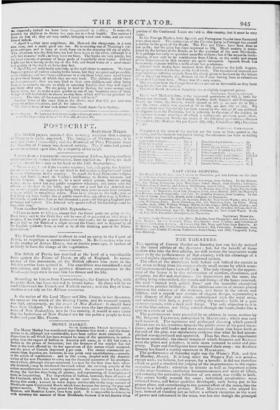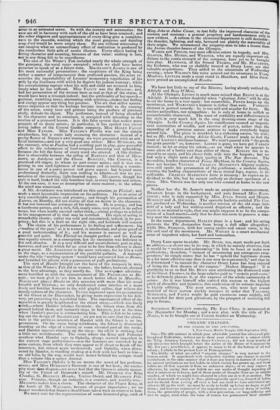THE THEATRES.
Tile opening of Covent Garden on Saturday last was briefly noticed in the latest edition of the Spectator'; but, for the benefit of those readers who take the first edition, we will restate the impression made upon us by the performances of that evening, with the advantage of a secohd night's experience of the reformed system. The effect of the alterations both before and behind the curtain is the more striking from the comparatively small means by which mate- rial improvements have been efl...eted. The only change in the appear- ance of the house is in the substitution of comfort, cleanliness, and elegance, for dirt and shabbiness : the decorations are the same, the gilding being reburnished, the panels and linings of the boxes renewed, the roof fretted with golden fires," and the beautiful chandelier restored to pristine brilliancy. The additions consist of statues placed between the columns of the staircase, and busts in the saloon and lobbies, nod a superb new curtain of elegant design, representing a rich drapery of blue and silver, embroidered with the royal &IDS, /aid adorned with badg s, partly veiling the massive folds of a pale crimson, curtain, with a deep gold fringe. The only objection to it is that the blue colour, not beim; carried through the house, looks like a spot in a circle of red.
The performances were preceded by an address, in verse, written by Mr. Sergeant TALIOURD, and spoken by MacanaDv ; which was very well received. The rapturous and prolonged cheering which greeted MACHEADV 011 his entrance, bespoke the public sense of his good inten- tions ; and the still louder and more universal shout that burst forth at the end of the play, was satisfactory evidence that what he had accom- plished was appreciated and approved. Thus far, then, the experiment has been successful : the classic temple of which SIDDONS and KLMLLE were the priest and priestess, is once more restored to order and pro- priety. Paste and intelligence have resumed their sway : the KEMBLE dynasty has found a worthy successor in MAcltEADY. The performance of Saturday night was the Winter's 7'ale; and that of Monday, ilandet. It is long since the Winter's Tale was acted— except once, we believe, last season, for a benefit : it did not therefore afford so good a standard for judging of the improvements in the repre- seotation as Hanikt: attention to minute as well as important points of the stage business, producing homogeneousness and unity of effect, and evincing the pervading influence of one mind, was visible in both. The actors hardly seemed the same ; individual peculiarities were softened down, and better qualities developed ; each being put in his proper place, and contributing to the general effect of the scene, hike the figures in a well-painted picture. Even MACREADV, who played his best, instead of standing out as before a solitary exception to the want of power and refinement in the mass, was but one though the principal
actor in an animated scene. So with the scenery and accessories: the new are all in harmony with such of the old as have been retained; and the sober elegance and appropriateness of every thing give a complete- ness to the ensemble, wanting which the most gorgeous and dazzling coup &ail would be mere empty show. No one without witnessing it can imagine what an extraordinary effect of realization is produced by the numberless little aids of scenic illusion. Every object having its fitting character and meaning, becomes of due value: nothing is lost, nor is any thing felt to be superfluous. The cast of the Winter's Tale included nearly the whole strength of the company, the vocal corps excepted ; which we shall have better occasion to speak of at a future time. MACREADY'S Lcontes is one of Ids most successful personations the suspicions of the King being rather a matter of temperament than profound passion, the actor re- conciles the improbability of Leontes' momentary repudiation of his wife by the liveliness with which he depicts his jealous humour ; while Isis overwhelming rapture when his wife and child are restored to him, imply what he has suffered. Miss FAUCIT was the Hermione ; and, bad her personation of the woman been as real as that of the statue, it would have been a triumph indeed : but the artificiality of her speech— guttural, trembling tones, alternating with whining—makes her feeling and energy appear any thing but genuine. The art that stifles sponta- neous impulses so that the feelings become insensible to the cunning of the scene, every tone and gesture being the produce of previous study, defeats its object. The performer, instead of being absorbed in the character and its emotions, is occupied with attending to the routine of a prepared lesson. It is this false system that makes mere puppets of so many actors ; in particular, it has spoiled two clever young ladies of the Covent Garden company, Miss HELEN FAUCIT and Miss TAYLOR. Miss TAYLOR'S Pcrdita was not the simple shepherdess, but a court lady assuming the character : instead of a pretty flower of Nature's own rearing, we were presented with an arti- ficial imitation—and not a very good one either. Miss HUDDART, on the contrary, who as Paulina had a scolding part to play, gave powerful effect to the vehemence of loud-tongued lamenting and upbraiding, because she felt the force of every word she uttered. A like distinc- tion is observable between the acting of BARTLEY and that of MEA- DOWS, as Autolycus and the Clown. BARTLEY, like COOPER, is a practiced old stager, to whom no part comes amiss; and it was sur- prising to see such lightness of movement and so smiling a counte- nance in one of a pussy person snd grave aspect : but beyond mere professional dexterity, there was nothing to admire—it was no per- sonation of the cunning, light-hearted rogue. MEADOWS, though his style is hard, looked the silly brainless lout, in every feature and action. In the one case, it was an assumption of mere manner; in the other, the mind was concerned.
A Mr. ANDERSON was introduced on this occasion, as Florizel; and made a most favourable impression on the audience. He is an actor of very considerable powers and promise ; and though his personation of Laertes, on Monday, did not realize all that we desire in the character, it has not lowered our estimate of his talents. He is young ; and has a handsome person, and a rich, full, manly voice, very sweet in its softer tones, but when loudly exerted rather thick,—owing perhaps to a defect
in his management of it, that may be rectified. His style of acting is remarkably chaste; rather too cold and constrained, indeed, in its pro- priety; but this is a fault on the right side, and habitude will remove it. The charm of his performance is its feeling and refinement: his 14 reading of the part," as it is termed, is intellectual, and gives proof of a good understanding of it ; and his manner is earnest as well as graceful and quiet. His Florizel we thought perfect : and his Laertee was equally correct as a conception, but its execution was deficient in fire and abandon. It is a very difficult and unsatisfactory part to play, however, and one in which for an actor to be free from offence is alone a great merit. .Ir. ANDERSON is the more welcome, for he fills a void in the stage, as a representative of the youthful gallants. A manager under the vile "starring system " would have announced him as Romeo, and heralded his advent with a procession of puffs preliminary.
The cast of Hamlet brought out the force of the company in men, as that of the Winter's Talc did in women ; the ladies, however, showed
to the best advantage, as they mostly do. One newspaper advertise- ment horrified us with the announcement of Mr. PRITCHARD as Ho- ratio ; we were glad to see him to much better effect in Mareellus. 11lAcitEauv played Hamlet on this occasion with more than his usual breadth and freedom ; we only desiderated some touches of a more lively and familiar humour in the wild playful sallies, that relieve the moody sadness of the character. ELTON improved upon his personation of the Ghost at the Haymarket, by giving more expression to his deli- very, yet preserving the sepulchral tone. The supernatural effect of the apparition is greatly heightened in the closet scene,—which was finely acted,—where Hamlet rebukes Gertrude : the Ghost rises from the ground behind them, and instantly steps in between, just at the time when 'hamlet's passion is o'ermastering him. This is felt to be carry- ing out the design of SHAKSPEARE : we are not so sure that the altera- tion in the previous interview of Hamlet with the Ghost is im im- provement. On the scene being withdrawn, the Ghost is discovered standing on the edge of a turret, or some elevated part of the castle, and Hamlet appears climbing up the steep : the effect is striking, but a little too melodramatic. The scene where the King and I'olonius overhear what Hamlet says to °Olefin, always seemed imperfect in the current stage performance—now the listeners are screened by an arras curtain, from which they once appear as if about to break off the interview, but retreat again unobserved; and Opheliu, when disco- vered by Hamlet, is standing reading at a desk with her back to him— an old folio, by the way, would have better befitted the aritipre stand than a volume like a spruce Annual.
Miss TAYLOR'S Ophelia is by no means the worst of her perform. ances ; and Miss II ennater's Gertrude is one of her best ; she excites pity more than disgust—we never feel that the Queen is utterly unwor- thy of the Prince of Denmark's regard. Mr. DIDDEAR was King Claudius, G. BENNETT H6 ratio, VINING Osrick, and Msanows Pao- Polonius, though an imbecile, is a courtier, and worldly-wise : 31Ea flows makes him a clown. The character of the Player King, in the hands of Mr. 1VastatoN, became of proper importance ; we no longer wondered that Hamlet should have taken such an interest in him. We must wait for the representation of some historical play, such as
King John or Julius Cesar, to test fully the improved character of the scenery and costume : a general propriety and handsomeness only is now evident. A reform in the elemental department is still desirable: the thunder, lightning, and rain, betrayed too plainly the materiality of their origin. We recommend the property-man to take a lesson from the Jovian thunder-bearer of the Olympic. Wallin and PHELPS, two most efficient actors in tragedy, and Mrs.. Gsovea, Mrs. HUMBY, and WEBSTER, who are equally important ad. ditions to the comic strength of the company, have yet to be brought into play. HAMMOND, of the Strand Theatre, and Mr. MACARTHY, the Irishman, who was so shabbily treated at Drury Lane, are also valuable acquisitions. They added to the attractions of Wednesday evening ; when WissoN's fine voice poured out its sweetness in Young Meadows, LEFFLER made a stout stand in Hawthorn, and Miss SHIR- REFF proved an accomplished Rosetta.



























 Previous page
Previous page